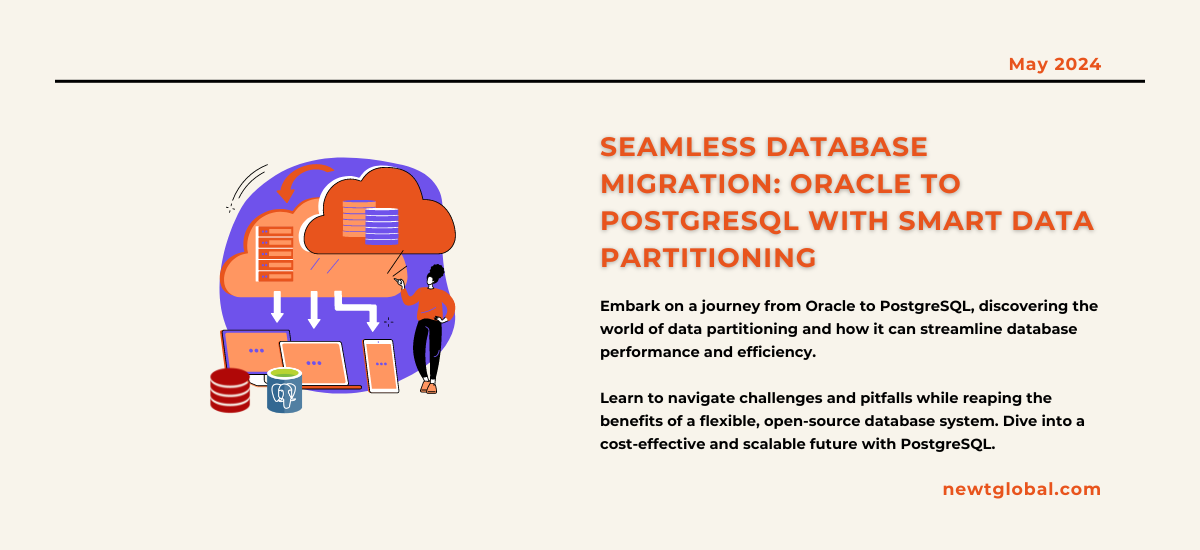
Let’s talk about making databases work better by moving data around smartly. We’re going on a trip into the world of splitting up data into pieces to make everything run faster and smoother. Nowadays, everyone wants to move quickly and save money, so a lot of smart people are switching their databases from Oracle, an old but good system, to PostgreSQL, a newer, cheaper, and open-source system. This move is exciting because it promises to make things less expensive and more flexible, but it’s also a bit tricky and needs us to pay close attention.
Unveiling the World of Partitioning
-
- Oracle: Oracle has a fancy way of organizing data into partitions based on lists, ranges, or hashes. It also has cool features like automatic list partitioning.
-
- PostgreSQL: PostgreSQL does partitioning too, but in a simpler way. It also offers list, range, and hash partitioning to manage data better.
Navigating the Pitfalls: A Guide to Smoother Migration
1. Differences in Syntax and Features
-
- Problem: Moving from Oracle to PostgreSQL means dealing with different ways of organizing data. Some features in Oracle don’t have direct equivalents in PostgreSQL.
-
- Solution: We can use tools to help with the transition, but we might need to adjust things manually. Also, consider changing how we organize data to fit better with PostgreSQL’s strengths.
2. Maintenance of Partitions
-
- Problem: In Oracle, tasks like splitting or merging partitions are automated. But in PostgreSQL, we have to do these tasks manually.
-
- Solution: We can create scripts to automate these tasks or explore event triggers in PostgreSQL to help.
3. Performance Issues
-
- Problem: There might be differences in how fast Oracle and PostgreSQL handle data, which could affect performance.
-
- Solution: We need to look into PostgreSQL’s tools for optimizing performance and use them to make our queries faster.
4. Indexing and Constraints
-
- Problem: It’s tricky to replicate certain features from Oracle to PostgreSQL, like certain types of indexes and constraints.
-
- Solution: We can create similar indexes on each partition in PostgreSQL and use certain constraints to keep our data consistent.
5. Data Types and Functions
-
- Problem: Some data types and functions in Oracle don’t have direct matches in PostgreSQL.
-
- Solution: We can map Oracle data types to similar ones in PostgreSQL and write custom functions if needed.
6. Transactions and Locks
-
- Problem: Oracle and PostgreSQL handle transactions and locks differently, which could cause issues.
-
- Solution: We need to understand how PostgreSQL handles these things and adjust our transactions accordingly.
7. Migrating Large Datasets
-
- Problem: It’s hard to move lots of data from Oracle to PostgreSQL without causing downtime.
-
- Solution: We can use tools that let us move data gradually, so our Oracle database can stay up while we transition to PostgreSQL.
8. Cultural Change
-
- Problem: Moving to PostgreSQL isn’t just a technical change; it’s also a shift in how we approach database management.
-
- Solution: We should get involved in the PostgreSQL community for support and training to help our team adapt.
Ultimatum
Moving from Oracle to PostgreSQL, especially with data splitting, is a big task but can bring a lot of benefits. By carefully dealing with any issues and using all the cool features PostgreSQL offers, organizations can make their databases work better, save money, and be ready for the future. We’re here to help you through this transition with advice on splitting data and solving any problems that come up.
Ready to take the leap and make your database migration a success story?
Newt Global DMAP is a world-class product designed specifically for this purpose. It’s built to help you move your Oracle database to a cloud-native PostgreSQL, enhances performance, scalability, and cost efficiency.
Visit newtglobal.com to learn more suggests that readers can find additional information, resources, and details about Newt Global’s services and products by visiting their website. This could include more in-depth explanations of their migration solutions, case studies, client testimonials, and more.
Reach out to us at marketing@newtglobalcorp.com to get started indicates that readers who are interested in initiating a migration project or have questions can contact Newt Global directly via email. By reaching out to the provided email address, readers can engage with the company’s marketing team to begin discussions, receive personalized assistance, request consultations, or get further guidance on how to proceed with their migration journey.
